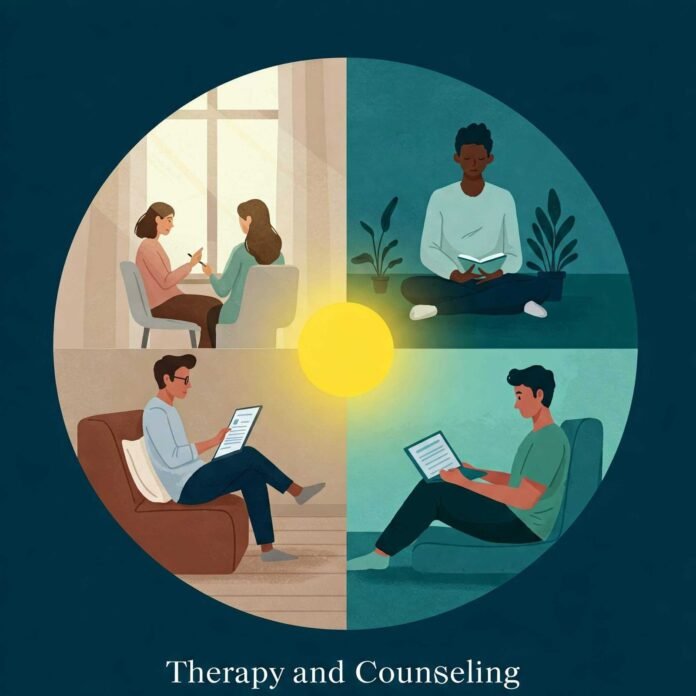Therapy vs counseling—man, what a head-scratcher, huh? I’m sprawled in my tiny Bangalore flat, the fan wobbling like it’s drunk, and the air smells like monsoon rain and the sambar I burnt trying to impress my neighbor. I’m hammering this out like I’m gossiping with a buddy over a lukewarm chai, probably spilling some as I flail my hands. I’ve tried both therapy and counseling here in India, and let me tell ya, it’s been a sloppy, kinda mortifying ride. Like, I thought I was all cool and collected, but nope—I’m a hot mess express. Here’s my raw, slightly botched take on therapy vs counseling, from an American tripping over himself in Bangalore’s chaos.
Why Therapy vs Counseling Even Got Me Stressed
Okay, so, therapy vs counseling—what’s the difference, anyway? I used to think they were, like, the same thing, like calling a vada pav a burger (sorry, India). Total rookie move. Therapy’s like diving into the deep end of your brain with no floaties, while counseling’s more like splashing in a puddle with a lifeguard. I figured this out after moving to India and completely losing my sh*t. Picture me, jetlagged, sweaty, yelling at a stray dog in a Koramangala street because it nabbed my sandwich. Not my finest hour, trust me.
Therapy digs into your whole life—childhood drama, weird quirks, the works. Counseling’s more like, “Yo, help me not freak out over this work email.” Both are mental health support, but they feel totally different. I wandered into a therapist’s office in Jayanagar expecting a quick pep talk and ended up blubbering about how I forgot to call my mom for a month. Cringe central. If you’re stuck on therapy vs counseling, ask yourself: you wanna unpack your whole soul or just fix one annoying thing?

My Therapy Trip: A Deep, Awkward Plunge
Therapy was like signing up for a six-hour Bollywood tearjerker with no popcorn—intense, emotional, and way too much. I found this therapist in Indiranagar, her office smelling like jasmine and old paper, with a couch that squeaked every time I squirmed (which was, like, every five seconds). She kept saying “let’s unpack your feelings,” and I’m like, uh, can we just fix my traffic rage? But nope, we went full-on deep dive. I ended up admitting I cried when I lost my favorite hoodie in the move to India. Like, who cries over a hoodie? Me, apparently.
Therapy’s awesome for big stuff—anxiety, old wounds, or why I get so pissed when my auto driver takes the scenic route (it’s a control thing, duh). It’s talk therapy, but it’s like peeling a never-ending onion—tears, stink, and all. It helped me see how moving to India turned my brain inside out, but it took forever. Like, months of sessions, and I’m still not “fixed.” If you’re ready for a long, sloppy haul, therapy’s your jam. Check out this Psychology Today article for more on what therapy digs into.
Stuff I Wish I Knew About Therapy
- It’s exhausting. I’d leave sessions feeling like I’d been hit by a Bangalore bus.
- You’ll cry over dumb sh*t. Lost hoodie? Full-on waterworks.
- Find a therapist who vibes with you. Mine got my American whining but called me out when I dodged the hard stuff.
Counseling: My Sloppy Lifesaver
Counseling, though? That was my go-to when I just needed to not implode. Last week, I was losing it over a work deadline—classic American overachiever, even in India. I found this counselor in Whitefield, her office above a momo stall, smelling like steamed dumplings and hope. Counseling was less about my whole life and more like, “Okay, how do I not yeet my laptop over this email?” It was practical, like a mental health Band-Aid that actually sticks.
Counseling’s great for specific problems—work stress, a bad date, or figuring out how to not snap at your neighbor’s 3 a.m. karaoke. My counselor taught me breathing tricks I still use when Bangalore traffic makes me wanna scream. But I screwed up by thinking it’d fix everything—it’s not for deep trauma. I spent a whole session ranting about my landlord’s leaky sink instead of my actual stress. Big oops. For more on counseling, Verywell Mind’s got a good rundown.

Counseling Mistakes I Made
- Stay focused. I rambled about my landlord’s sink instead of my stress—huge L.
- Try different counselors. My first one was too formal; the momo-stall lady was my people.
- It’s not therapy. Don’t expect it to fix your whole damn life.
Therapy vs Counseling: Picking Your Poison
So, how do you choose between therapy and counseling? It’s like picking between a full-on biryani or a quick samosa—depends on how much you can stomach. Therapy’s for when you’re ready to wrestle your inner chaos; counseling’s for when you just need to not trip over it. I’ve done both, and I’m still a hot mess. Like, sometimes I think I need therapy to deal with my counseling sessions. For realz.
Ask yourself: you drowning in big emotions or just stuck on one thing? Therapy’s better for long-term patterns; counseling’s great for immediate fixes. Money’s a thing too—therapy’s pricier, and in India, mental health support ain’t always cheap. I learned that after blowing my budget on sessions and eating Maggi noodles for a week straight. Also, make sure your therapist or counselor gets you. I had one who kept calling me “Grock” instead of “Grok”—like, dude, c’mon.

Wrapping Up This Therapy vs Counseling Rant
Look, therapy vs counseling ain’t a perfect science. I’m just an American dude in Bangalore, sweating through my shirt, trying to keep my brain from melting. Therapy helped me untangle my mess; counseling kept me from chucking my phone during deadlines. Both are legit, but both take work. I’m still screwing up, still learning, and that’s fine by me. Mental health support’s a marathon, not a sprint, ya feel?


































